We totally understand that as a parent, you might have worries and questions about your child’s autism diagnosis. It’s completely normal to wonder why it happened and if you had any role in it. You may be asking, “What caused my child’s autism?”
The good news is that research shows there’s no single cause of Autism Spectrum Disorder (ASD), and you didn’t cause your child’s autism. Autism Spectrum Disorders are a complex condition shaped by a mix of genetic and environmental factors. However, as we continue to learn more about autism, some risk factors have been identified as potential contributors.
At The Clubhouse, our caring and compassionate team of board-certified therapists is here to support both you and your child. We truly believe that your love and involvement are key to your child’s growth and development.
Learn More About How We Can Help Your Kid Thrive Today!
In this article, we’ll dive into what we know about the possible causes of ASD and how we can help your child thrive.
Genetic Factors
Autism Spectrum Disorder (ASD) has a strong genetic link, as shown by various studies. For example, twin studies published in Behavior Genetics journal reveal that if one identical twin has ASD, the other is likely to have it too by 96%, pointing to genetics being a big factor.
Scientists have found many genes linked to ASD, but no single gene causes it. Instead, it seems like a mix of different genetic variations that leads to autism.
It’s important to remember that while genetics play a role, they don’t do it alone. They work alongside environmental factors, and just having a genetic risk doesn’t mean a child will develop autism. Our understanding of these genetics is always improving, which helps us create better support and treatment for autistic children and their families.
At The Clubhouse, we’re here to help you with compassionate and comprehensive care to ensure your kid with autism overcomes any unique challenges and continues to thrive.
Learn More About How We Can Help Your Kid Thrive Today!
Environmental Influences
Genetics plays a big role in Autism Spectrum Disorder (ASD), but environmental factors can also affect the child’s risk, even though they don’t directly cause it. Research shows that certain factors when combined with genetic traits, can increase the chance of developing autism.
One factor is having older parents. Kids born to older parents are at an increased risk for autism. A study in Autism Research pointed out that both mom and dad’s age can contribute to this risk because of genetic changes that happen as we age.
Exposure to environmental toxins during pregnancy is another concern. For example, studies show that being around air pollutants like heavy metals and pesticides while pregnant has been linked to a higher risk of autism.
Maternal health issues such as obesity and diabetes can also play a role, especially when the mother has both. Research published in the Pediatrics journal suggests these conditions may affect how the baby’s brain develops, possibly raising the risk of ASD.
Finally, complications during birth that cause oxygen deprivation have been linked to a higher autism risk. A study in the Pediatrics journal found that issues like birth asphyxia and unusual position in the womb could increase the risk of developing autism, highlighting the need for good care during delivery.
Interaction of Factors
Understanding how genetics and the environment work together is important for studying Autism Spectrum Disorder (ASD). Autism isn’t caused by just one thing; it comes from a mix of factors that can affect brain development in different ways. Researchers are still digging into these connections, but there’s still a lot we don’t fully understand.
Genes play a key role, possibly making some kids more vulnerable to autism when certain environmental factors come into play. For example, a child might have a genetic makeup that makes their brain development more sensitive to outside influences. Studies have shown that genetic changes affecting how neurons develop and communicate can interact with environmental triggers, impacting brain structure. Factors like exposure to toxins during pregnancy or older parents can also raise the risk by interacting with the child’s genetic background.
The exact biological processes behind autism are still being explored, and there’s no single cause. Animal studies, brain imaging, and public health research are helping us uncover more, showing that autism likely starts from early development involving both inherited traits and environmental factors.
By understanding the different factors that might contribute to ASD, we can customize our therapies to suit each child’s needs, ensuring they get personalized care that helps them reach their unique potential. Our approach is all about compassion and expertise, guiding families through their journey with autism.
Learn More About How We Can Help Your Kid Thrive Today!
What Doesn’t Cause Autism
It’s really important to know that vaccines don’t cause autism. Lots of research over the years has shown no link between childhood vaccines and autism. A meta-analysis published in 2020 found no risk of autism with the MMR vaccine.
Autism is a condition that’s there from birth, and studies show that the brain differences related to autism start early on, not from factors like vaccines. This means as a parent, it’s not your fault if your child has autism.
Instead of worrying, try to focus on recognizing and celebrating your child’s unique strengths and understanding their needs. This way, you can provide the best support and create a loving environment for them to grow. At The Clubhouse, we believe in empowering families with personalized support to help them appreciate and nurture their child’s potential at every stage.
Learn More About How We Can Help Your Kid Thrive Today!
No, You Didn’t Cause Your Kids’ Autism: Final Thoughts
Autism is a complex condition, and while genetics and environmental factors may play a role, there is no one specific cause. As a parent, it’s important to understand that you did not cause your child’s autism. Instead of blaming yourself or searching for a single cause, focus on providing love, support, and understanding for your child.
Every child with autism is unique and has their own strengths and challenges. With the right support and understanding, children with autism can lead fulfilling lives and reach their full potential. Always remember that you are not alone in this journey and there is a community of support available for you and your child.
At The Clubhouse, we understand the challenges families face when raising a child with autism. We are here to provide compassionate care and personalized support to help your child reach their full potential. Our team of experts works closely with families to create individualized therapy plans that address each child’s unique needs.
If you have any concerns about your child’s development or want to learn more about how we can help your child thrive, contact us today!

